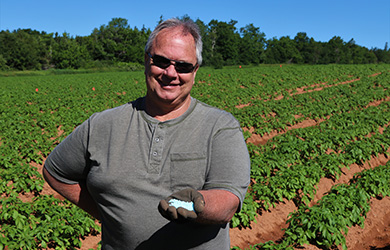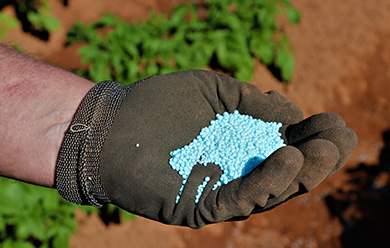For more information
Media Relations
Agriculture and Agri-Food Canada
1-866-345-7972
aafc.mediarelations-relationsmedias.aac@agr.gc.ca
Nitrogen, a major component of fertilizer, is a very important nutrient that helps grow healthy and plentiful crops. In regions where crops receive water from rainfall as opposed to irrigation, it is much harder to predict where and when to use fertilizer and how much to apply. This predicament can result in the inefficient use of fertilizer, that may lead to reduced yield or harmful nutrients entering soil, streams and rivers, as well as increasing greenhouse gas emissions.
Being precise with modern fertilizers
Precision agriculture is helping farmers be more exact with inputs, like fertilizer, to help reduce excess nitrogen and greenhouse gas emissions without sacrificing yields. The concept uses precise scientific data and new technologies to help farmers pinpoint what their crops need so that they can use the right product in the right amount, in the right place, at the right time.
Steve Watts of Genesis Crop Systems recently wrapped up a precision agriculture research project with support from Prince Edward Island (PEI) farmers, Agriculture and Agri-Food Canada (AAFC), and researchers from Dalhousie University and the PEI Department of Agriculture and Land. Steve and the team studied the use of an enhanced efficiency dual inhibitor fertilizer product, called SUPERU®, in potato crops. This modern fertilizer provides nitrogen to plants as they need it over a period of time and reduces nitrogen loss from plants and soil. The research is part of Living Lab — Atlantic, a collaboration between AAFC, farmers and environmental organizations on PEI. Together, they address several key areas impacting farmers, including soil health, water quality management and crop productivity. The farming practices they are studying and expertise gained will be shared with farmers across Canada to increase adoption.
"Enhanced efficiency fertilizers provide nutrients to crops little by little and that can provide more efficient levels of nutrition over an extended period of time rather than the crop getting everything at once. It’s like giving crops three square meals a day instead of every meal at breakfast."
- Steve Watts, Genesis Crop Systems
A major boost to Canada’s Emissions Reduction Plan
From 2019 to 2021, Steve set up several treatments including the grower standard fertilizer type and others with varying mixtures of standard and enhanced efficiency fertilizers.
Soil sampling and field results like greenhouse gas emissions were measured by Steve, Kyra Stiles and her team from the PEI Department of Agriculture and Land at six participating farmer’s fields on a weekly basis before planting and throughout the season. Further analysis of greenhouse gas emissions was completed by Dr. David Burton and his team at the Dalhousie University Faculty of Agriculture and additional analysis by AAFC scientists at the Charlottetown Research and Development Centre.
What the team discovered will be a major boost to Canada’s and farmers’ important role in meeting and exceeding Canada's 2030 greenhouse gas emissions reduction target and achieving net-zero by 2050. The project revealed that farmers adopting the use of enhanced efficiency fertilizer could maintain their current potato yields and profitability at the same input costs, while reducing greenhouse gas emissions by a whopping 30% or more; which is certainly exciting news for Canadians and the environment.
Farmers taking notice
Living Lab — Atlantic participating farmer, Vernon Campbell, of Mull Na Beinne Farms Ltd is now a firm believer after having several of his fields involved in the research trials. Vernon had heard a little about enhanced efficiency fertilizers but was not aware of specific products and how they could benefit farmers. It was Steve and Living Lab — Atlantic that introduced the product to Vernon and other farmers.
"Enhanced efficiency fertilizers are the way of the future and a win-win product for farmers and the environment. The first win is that it’s better for crop production getting nitrogen to plants when they need it throughout the season and the second win is in the reduction of greenhouse gas emissions."
- Vernon Campbell, Mull Na Beinne Farms Ltd
The results of this project show the power of having farmers, scientists and organizations working together towards a common goal like reducing greenhouse gas emissions. "AAFC’s Living Lab is at the forefront of this — a great venue to bring forth new practices, try them in the field and have them available for farmers to see the results," says Vernon.
Steve explains that the majority of farmers he works with, like Vernon, have now adopted enhanced efficiency fertilizer on much of their potato acreage. The next step is to spread the word to the Canadian agriculture industry for the benefit of their bottom lines and the environment. Fortunately, Agricultural Climate Solutions an AAFC initiative to help farmers tackle climate change, will continue to research fertilizers. And that makes it a win-win-win for Canadian farmers.
Key Discoveries/Benefits:
- Precision agriculture is one of many ways where farmers are being more exact with inputs like fertilizer to help reduce excess nitrogen and greenhouse gas emissions without sacrificing yields.
- Steve Watts of Genesis Crop Systems recently wrapped up a study in collaboration with AAFC, Dalhousie University and the PEI Department of Agriculture and Land to examine the use of enhanced efficiency fertilizer in potato crops. This modern fertilizer releases nitrogen to plants as they need it over a period of time.
- The project revealed that farmers adopting the use of enhanced efficiency fertilizers could maintain their current potato yields at the same costs while reducing greenhouse gas emissions by a whopping 30% or more; which is certainly exciting news for Canadian farmers and the environment.
- Agricultural Climate Solutions, an AAFC initiative to help farmers tackle climate change, will continue to research fertilizers.
Photo gallery

Steve Watts of Genesis Crop Systems shows off the innovative enhanced efficiency fertilizer at Mull Na Beinne Farms Ltd, one of six farmers that participated in the research trials.

Enhanced efficiency fertilizers release nitrogen as plants need it over a period of time which helps reduce greenhouse gas emissions.